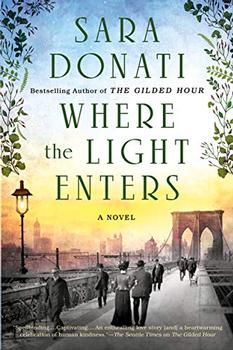Summary | Excerpt | Reading Guide | Discuss | Reviews | Beyond the book | Read-Alikes | Genres & Themes | Author Bio

In this thrilling follow-up to The Gilded Hour, doctors Sophie and Anna Savard take on a baffling murder case that leads them into the seedy underworld of 19th century New York. Dr. Sophie Savard has just returned from Europe after the death of her husband and is eager to continue her practice as an obstetrician in Manhattan. The year is 1884, and although great strides have been made in science and industry, the women's rights movement has yet to gain momentum. Basic health care needs unique to women, such as birth control (condoms and diaphragms were in use by this time, as well as an early version of the IUD) and gynecological exams, are not widely available, which is why both Sophie and her cousin Anna dedicate themselves to helping society's forgotten citizens. So when the mysterious murder of a young woman is brought to their attention, they can't refuse the chance to be consultants on the case. It soon becomes clear, however, that there's more to this crime than meets the eye; a string of other victims seem to be connected, and all of them were women seeking an abortion. As the two doctors begin to close in on the killer, they make a startling discovery that forces them to question their own ideas of right and wrong.
It's refreshing to read a novel with such resilient female characters who not only know their worth, they have no qualms about reminding the men in their lives of it as well. In one memorable scene, a gentleman expresses his surprise at Sophie's outspoken manner. After a laugh, she simply replies; "You might find this odd, but I'm not offended to be thought of as blunt. I like it." It's this spirit of boldness and self-assurance that make Sophie and Anna so fascinating in a profession filled to the brim with stuffy old men. On top of this, Sophie is African American, making her even more of an anomaly. There is a strong feminist undercurrent throughout the novel, also evident in the complex women's issues at the core of the plot regarding pregnancy and abortion at a time when little help was available to women in need. The natural desire many women feel to be a mother, and what happens when women are denied that impulse, are also explored in haunting detail.
The history of medicine in the 19th century is vividly brought to life. It's obvious that Donati did her research when it comes to medical terms and practices from the era, because the many instances of examination and diagnosis read like authoritative case histories. Descriptions of house-calls are stark and gritty in their portrayal of inner-city life: "The candlelight played over a litter of hypodermic needles on the floor, cast aside carelessly, along with gauze stained with dried blood." An interesting side-drama unfolds around Sophie's endeavor to teach medicine. The reader is given access to every triumph and struggle in her mission to train the next generation of female physicians. And because Donati keeps building new developments on previous chapters, the jumps between the women's personal lives and their professional pursuits feel relevant, while also adding more complexity to the narrative.
With its focus on smart, courageous women physicians, who were a rarity but certainly not unheard of in the late 19th century (see Beyond the Book), Where the Light Enters easily sets itself apart in the genre of historical fiction. It is an excellent followup to The Gilded Hour, but also can be read as a standalone novel. The controversial themes, headstrong heroines and gripping accounts of high-stakes medical trials all come together to create a winning combination.
![]() This review was originally published in The BookBrowse Review in October 2019, and has been updated for the
August 2020 edition.
Click here to go to this issue.
This review was originally published in The BookBrowse Review in October 2019, and has been updated for the
August 2020 edition.
Click here to go to this issue.

If you liked Where the Light Enters, try these:

by Ariel Lawhon
Published 2024
From the New York Times bestselling author of I Was Anastasia and Code Name Hélène comes a gripping historical mystery inspired by the life and diary of Martha Ballard, a renowned 18th-century midwife who investigates a shocking murder that unhinges her small community.

by Ritu Mukerji
Published 2024
For fans of Jacqueline Winspear and Charles Todd, Murder by Degrees is a historical mystery set in 19th century Philadelphia, following a pioneering woman doctor as she investigates the disappearance of a young patient who is presumed dead.
No pleasure is worth giving up for the sake of two more years in a geriatric home.
Click Here to find out who said this, as well as discovering other famous literary quotes!
Your guide toexceptional books
BookBrowse seeks out and recommends the best in contemporary fiction and nonfiction—books that not only engage and entertain but also deepen our understanding of ourselves and the world around us.